牛津广州版英语八年级上知识梳理
- 格式:doc
- 大小:46.00 KB
- 文档页数:2
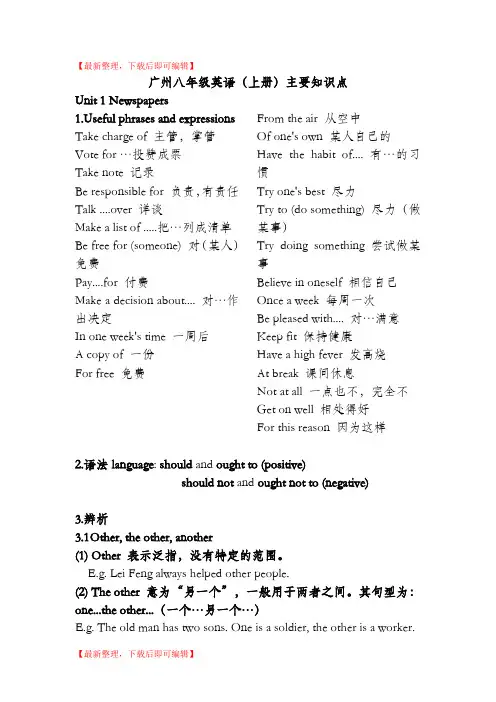
【最新整理,下载后即可编辑】广州八年级英语(上册)主要知识点Unit 1 Newspaperseful phrases and expressions Take charge of 主管,掌管Vote for …投赞成票Take note 记录Be responsible for 负责,有责任Talk ....over 详谈Make a list of .....把…列成清单Be free for (someone) 对(某人)免费Pay....for 付费Make a decision about.... 对…作出决定In one week's time 一周后A copy of 一份For free 免费From the air 从空中Of one's own 某人自己的Have the habit of.... 有…的习惯Try one's best 尽力Try to (do something) 尽力(做某事)Try doing something 尝试做某事Believe in oneself 相信自己Once a week 每周一次Be pleased with.... 对…满意Keep fit 保持健康Have a high fever 发高烧At break 课间休息Not at all 一点也不,完全不Get on well 相处得好For this reason 因为这样2.语法language: should and ought to (positive)should not and ought not to (negative)3.辨析3.1O ther, the other, another(1) Other 表示泛指,没有特定的范围。
E.g. Lei Feng always helped other people.(2) The other 意为“另一个”,一般用于两者之间。
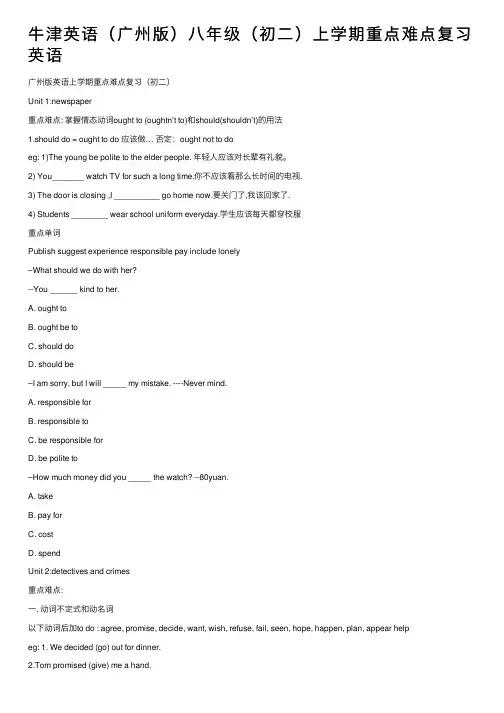
⽜津英语(⼴州版)⼋年级(初⼆)上学期重点难点复习英语⼴州版英语上学期重点难点复习(初⼆)Unit 1:newspaper重点难点: 掌握情态动词ought to (oughtn’t to)和should(shouldn’t)的⽤法1.should do = ought to do 应该做… 否定:ought not to doeg: 1)The young be polite to the elder people. 年轻⼈应该对长辈有礼貌。
2) You_______ watch TV for such a long time.你不应该看那么长时间的电视.3) The door is closing ,I __________ go home now.要关门了,我该回家了.4) Students ________ wear school uniform everyday.学⽣应该每天都穿校服重点单词Publish suggest experience responsible pay include lonely–What should we do with her?--You ______ kind to her.A. ought toB. ought be toC. should doD. should be–I am sorry, but I will _____ my mistake. ----Never mind.A. responsible forB. responsible toC. be responsible forD. be polite to–How much money did you _____ the watch? --80yuan.A. takeB. pay forC. costD. spendUnit 2:detectives and crimes重点难点:⼀. 动词不定式和动名词以下动词后加to do : agree, promise, decide, want, wish, refuse, fail, seen, hope, happen, plan, appear helpeg: 1. We decided (go) out for dinner.2.Tom promised (give) me a hand.3. I can’t help _____ (cry).我情不⾃禁的哭了。
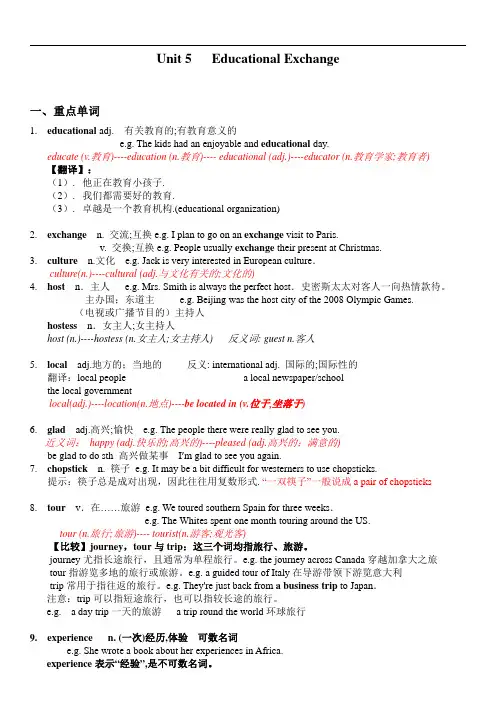
Unit5Educational Exchange一、重点单词cational adj.有关教育的;有教育意义的e.g.The kids had an enjoyable and educational day.educate(v.教育)----education(n.教育)----educational(adj.)----educator(n.教育学家;教育者)【翻译】:(1).他正在教育小孩子.(2).我们都需要好的教育.(3).卓越是一个教育机构.(educational organization)2.exchange n.交流;互换e.g.I plan to go on an exchange visit to Paris.v.交换;互换e.g.People usually exchange their present at Christmas.3.culture n.文化 e.g.Jack is very interested in European culture.culture(n.)----cultural(adj.与文化有关的;文化的)4.host n.主人 e.g.Mrs.Smith is always the perfect host.史密斯太太对客人一向热情款待。
主办国;东道主 e.g.Beijing was the host city of the2008Olympic Games.(电视或广播节目的)主持人hostess n.女主人;女主持人host(n.)----hostess(n.女主人;女主持人)反义词:guest n.客人5.local adj.地方的;当地的反义:international adj.国际的;国际性的翻译:local people_______________________a local newspaper/school________________________ the local government________________________local(adj.)----location(n.地点)----be located in(v.位于,坐落于)6.glad adj.高兴;愉快 e.g.The people there were really glad to see you.近义词:happy(adj.快乐的;高兴的)----pleased(adj.高兴的;满意的)be glad to do sth高兴做某事I’m glad to see you again.7.chopstick n.筷子e.g.It may be a bit difficult for westerners to use chopsticks.提示:筷子总是成对出现,因此往往用复数形式.“一双筷子”一般说成a pair of chopsticks8.tour v.在……旅游e.g.We toured southern Spain for three weeks.e.g.The Whites spent one month touring around the US.tour(n.旅行;旅游)----tourist(n.游客;观光客)【比较】journey,tour与trip:这三个词均指旅行、旅游。
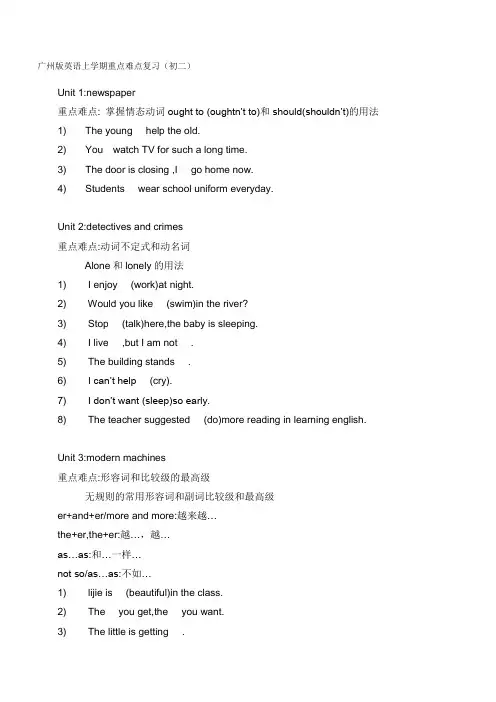
广州版英语上学期重点难点复习(初二)Unit 1:newspaper重点难点: 掌握情态动词ought to (oughtn’t to)和should(shouldn’t)的用法1) The young help the old.2) You watch TV for such a long time.3) The door is closing ,I go home now.4) Students wear school uniform everyday.Unit 2:detectives and crimes重点难点:动词不定式和动名词Alone和lonely的用法1) I enjoy (work)at night.2) Would you like (swim)in the river?3) Stop (talk)here,the baby is sleeping.4) I live ,but I am not .5) The building stands .6) I can’t help(cry).7) I don’t want (sleep)so early.8) The teacher suggested (do)more reading in learning english.Unit 3:modern machines重点难点:形容词和比较级的最高级无规则的常用形容词和副词比较级和最高级er+and+er/more and more:越来越…the+er,the+er:越…,越…as…as:和…一样…not so/as…as:不如…1) lijie is (beautiful)in the class.2) The you get,the you want.3) The little is getting .4) My coat is yours.和你的一样漂亮5) I am you.和你一样高6) This boos is that one.不如…有趣7) I am you are.不如你高Nuit 4:historical stories重点难点:现在完成时:2.时间状语:recently, lately, since…for…,in the past few years, etc.3.基本结构:have/has + done4.否定形式:have/has + not +d one.5.一般疑问句:have 或has。
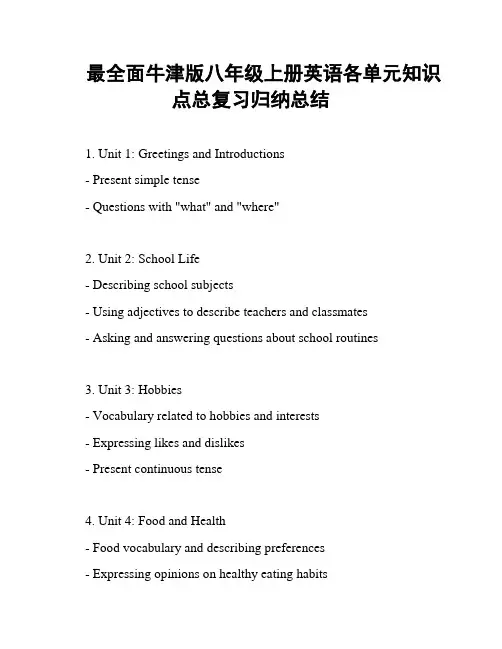
最全面牛津版八年级上册英语各单元知识点总复习归纳总结1. Unit 1: Greetings and Introductions- Present simple tense- Questions with "what" and "where"2. Unit 2: School Life- Describing school subjects- Using adjectives to describe teachers and classmates- Asking and answering questions about school routines3. Unit 3: Hobbies- Vocabulary related to hobbies and interests- Expressing likes and dislikes- Present continuous tense4. Unit 4: Food and Health- Food vocabulary and describing preferences- Expressing opinions on healthy eating habits- Imperative sentences for giving suggestions and instructions5. Unit 5: Holidays and Traditions- Vocabulary related to holidays and celebrations- Describing past events- Using time expressions and prepositions to talk about when and where6. Unit 6: Environment- Vocabulary related to environmental issues- Expressing concerns and suggestions for protecting the environment- Present perfect tense to talk about experiences7. Unit 7: Jobs and Career Choices- Vocabulary related to different professions- Talking about future plans and aspirations- Using "will" and "going to" for future predictions and intentions- Expressing opinions on advantages and disadvantages of technology- Present perfect continuous tense这份文档总结了八年级上册牛津版英语教材各单元的知识点。
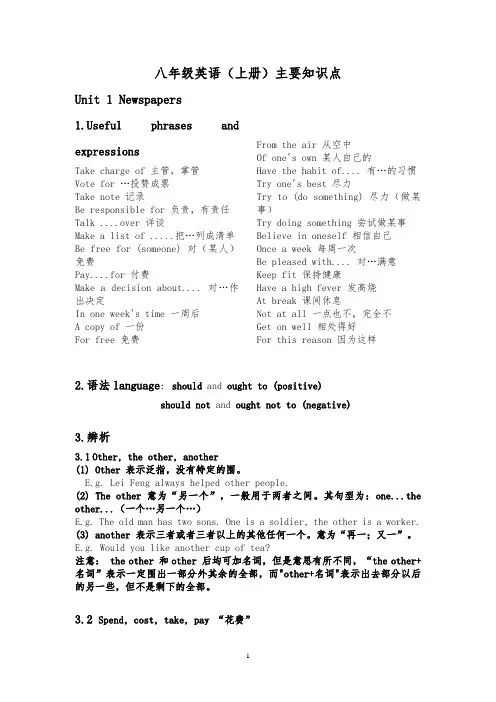
八年级英语(上册)主要知识点Unit 1 Newspaperseful phrases andexpressionsTake charge of 主管,掌管Vote for …投赞成票Take note 记录Be responsible for 负责,有责任Talk ....over 详谈Make a list of .....把…列成清单Be free for (someone) 对(某人)免费Pay....for 付费Make a decision about.... 对…作出决定In one week's time 一周后A copy of 一份For free 免费From the air 从空中Of one's own 某人自己的Have the habit of.... 有…的习惯Try one's best 尽力Try to (do something) 尽力(做某事)Try doing something 尝试做某事Believe in oneself 相信自己Once a week 每周一次Be pleased with.... 对…满意Keep fit 保持健康Have a high fever 发高烧At break 课间休息Not at all 一点也不,完全不Get on well 相处得好For this reason 因为这样2.语法language: should and ought to (positive)should not and ought not to (negative)3.辨析3.1Other, the other, another(1) Other 表示泛指,没有特定的围。
E.g. Lei Feng always helped other people.(2) The other 意为“另一个”,一般用于两者之间。
其句型为:one...the other...(一个…另一个…)E.g. The old man has two sons. One is a soldier, the other is a worker.(3) another 表示三者或者三者以上的其他任何一个。
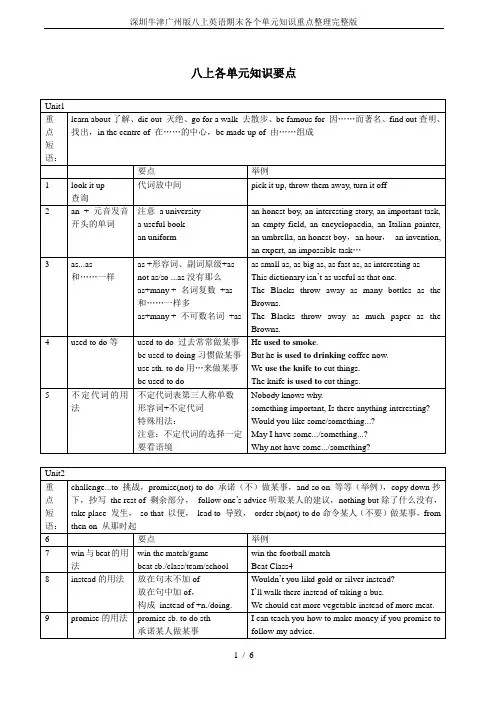
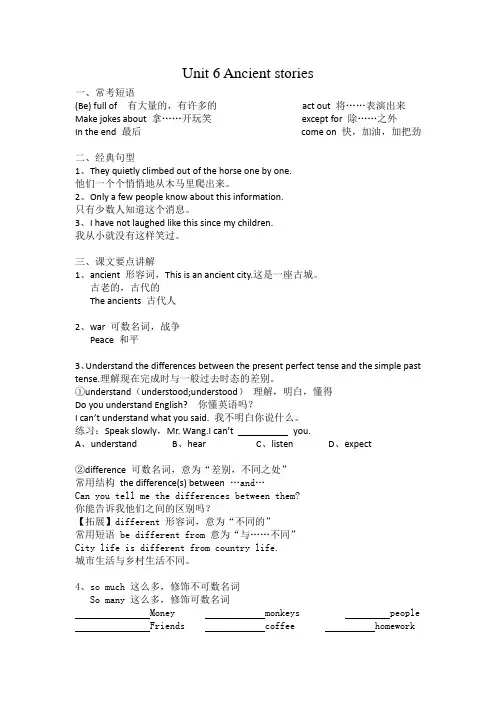
Unit 6 Ancient stories一、常考短语(Be) full of 有大量的,有许多的act out 将……表演出来Make jokes about 拿……开玩笑except for 除……之外In the end 最后come on 快,加油,加把劲二、经典句型1、They quietly climbed out of the horse one by one.他们一个个悄悄地从木马里爬出来。
2、Only a few people know about this information.只有少数人知道这个消息。
3、I have not laughed like this since my children.我从小就没有这样笑过。
三、课文要点讲解1、ancient 形容词,This is an ancient city.这是一座古城。
古老的,古代的The ancients 古代人2、war 可数名词,战争Peace 和平3、Understand the differences between the present perfect tense and the simple past tense.理解现在完成时与一般过去时态的差别。
①understand(understood;understood)理解,明白,懂得Do you understand English? 你懂英语吗?I can’t understand what you said. 我不明白你说什么。
练习:Speak slowly,Mr. Wang.I can’t you.A、understandB、hearC、listenD、expect②difference 可数名词,意为“差别,不同之处”常用结构the difference(s) between …and…Can you tell me the differences between them?你能告诉我他们之间的区别吗?【拓展】different 形容词,意为“不同的”常用短语 be different from 意为“与……不同”City life is different from country life.城市生活与乡村生活不同。
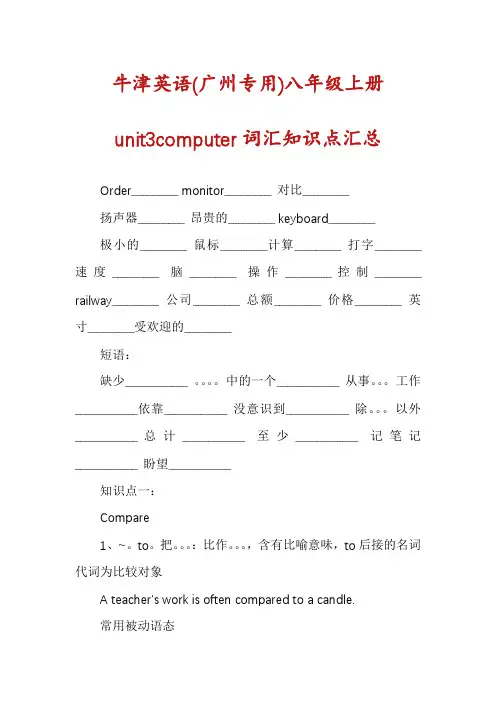
牛津英语(广州专用)八年级上册unit3computer词汇知识点汇总Order_________ monitor_________ 对比_________扬声器_________ 昂贵的_________ keyboard_________极小的_________ 鼠标_________计算_________ 打字_________ 速度_________ 脑_________ 操作_________控制_________ railway_________ 公司_________ 总额_________ 价格_________ 英寸_________受欢迎的_________短语:缺少____________ 。
中的一个____________ 从事。
工作____________依靠____________ 没意识到____________ 除。
以外____________总计____________ 至少____________ 记笔记____________ 盼望____________知识点一:Compare1、~。
to。
把。
:比作。
,含有比喻意味,to后接的名词代词为比较对象A teacher’s work is often compared to a candle.常用被动语态2、~。
with。
:把。
同。
比较,相比较的事物放with前后Please compare your translation with the model translation on the2022年牛津英语(广州专用)八年级上册unit3computer词汇知识点汇总单词默写版,适合教师使用。
blackboard.知识点二:一、频度副词1. 常见的频度副词有以下这些:(画比例图)2. always(总是,一直)3. usually(通常)4. often(常常,经常)5. sometimes(有时候)6. never(从不)2.频度副词的位置:a.放在连系动词、助动词或情态动词后面。
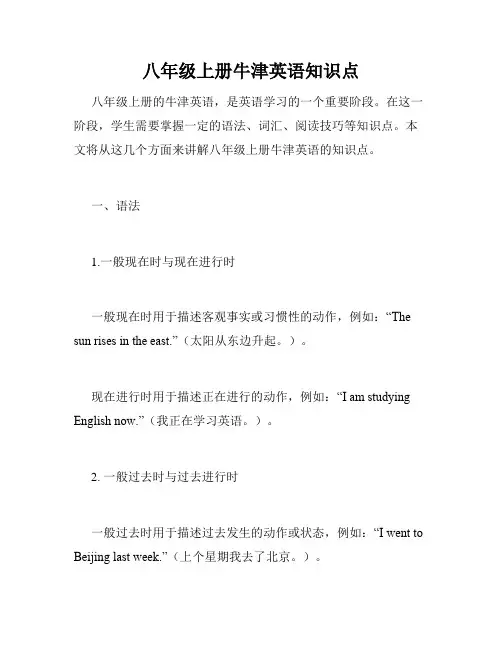
八年级上册牛津英语知识点八年级上册的牛津英语,是英语学习的一个重要阶段。
在这一阶段,学生需要掌握一定的语法、词汇、阅读技巧等知识点。
本文将从这几个方面来讲解八年级上册牛津英语的知识点。
一、语法1.一般现在时与现在进行时一般现在时用于描述客观事实或习惯性的动作,例如:“The sun rises in the east.”(太阳从东边升起。
)。
现在进行时用于描述正在进行的动作,例如:“I am studying English now.”(我正在学习英语。
)。
2. 一般过去时与过去进行时一般过去时用于描述过去发生的动作或状态,例如:“I went to Beijing last week.”(上个星期我去了北京。
)。
过去进行时用于描述过去某一时刻正在进行的动作,例如:“I was watching TV when the phone rang.”(电话响的时候我正在看电视。
)3. 现在完成时现在完成时用于描述过去发生的动作对现在造成的影响或结果,例如:“I have finished my homework.”(我已经完成了作业。
)二、词汇1. 认知词汇在八年级上册的牛津英语中,我们需要掌握大量的认知词汇,例如:“cell phone”(手机)、“internet”(互联网)、“computer”(电脑)等。
2. 时态动词在学习语法的同时,我们也需要掌握各种时态的动词,例如:“go”(一般现在时:go 学生, go to school)、“went”(一般过去时:I went to the park yesterday.)、“have gone”(现在完成时:I have gone to the park.)、“is going”(现在进行时:He is going to school.)、“was going”(过去进行时:I was going to school when it rained.)等。
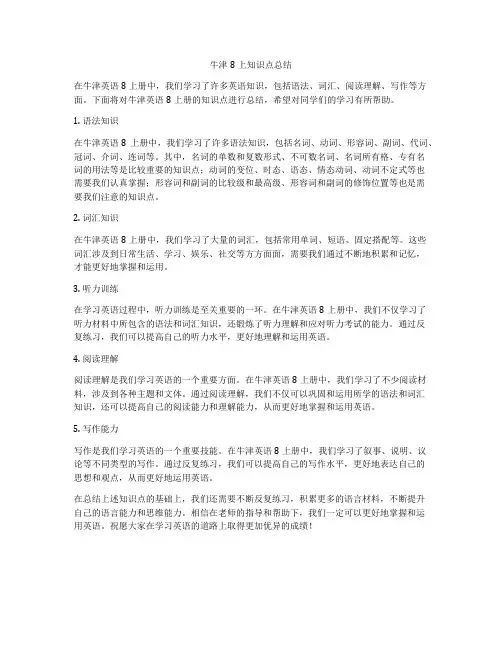
牛津8上知识点总结在牛津英语8上册中,我们学习了许多英语知识,包括语法、词汇、阅读理解、写作等方面。
下面将对牛津英语8上册的知识点进行总结,希望对同学们的学习有所帮助。
1. 语法知识在牛津英语8上册中,我们学习了许多语法知识,包括名词、动词、形容词、副词、代词、冠词、介词、连词等。
其中,名词的单数和复数形式、不可数名词、名词所有格、专有名词的用法等是比较重要的知识点;动词的变位、时态、语态、情态动词、动词不定式等也需要我们认真掌握;形容词和副词的比较级和最高级、形容词和副词的修饰位置等也是需要我们注意的知识点。
2. 词汇知识在牛津英语8上册中,我们学习了大量的词汇,包括常用单词、短语、固定搭配等。
这些词汇涉及到日常生活、学习、娱乐、社交等方方面面,需要我们通过不断地积累和记忆,才能更好地掌握和运用。
3. 听力训练在学习英语过程中,听力训练是至关重要的一环。
在牛津英语8上册中,我们不仅学习了听力材料中所包含的语法和词汇知识,还锻炼了听力理解和应对听力考试的能力。
通过反复练习,我们可以提高自己的听力水平,更好地理解和运用英语。
4. 阅读理解阅读理解是我们学习英语的一个重要方面。
在牛津英语8上册中,我们学习了不少阅读材料,涉及到各种主题和文体。
通过阅读理解,我们不仅可以巩固和运用所学的语法和词汇知识,还可以提高自己的阅读能力和理解能力,从而更好地掌握和运用英语。
5. 写作能力写作是我们学习英语的一个重要技能。
在牛津英语8上册中,我们学习了叙事、说明、议论等不同类型的写作。
通过反复练习,我们可以提高自己的写作水平,更好地表达自己的思想和观点,从而更好地运用英语。
在总结上述知识点的基础上,我们还需要不断反复练习,积累更多的语言材料,不断提升自己的语言能力和思维能力。
相信在老师的指导和帮助下,我们一定可以更好地掌握和运用英语。
祝愿大家在学习英语的道路上取得更加优异的成绩!。
some 一些,某些,某个。
可代替名词和形容词。
常用于肯定句。
在句子中用作主语、宾语、定语.作定语时,它可以修饰单数可数名词和复数可数名词,也可以修饰不可数名词。
1。
用于肯定句Ask some boys to help you.(修饰复数可数名词)叫些男孩来帮助你.Please bring some coffee.(修饰不可数名词)请拿些咖啡来.Ask some girl to come here.(修饰单数可数名词)叫(某)个女孩来这儿。
2。
some 用于疑问句时表示“请求、邀请或希望得到肯定的回答”。
Would you like some coffee?(表示请求、邀请)请喝咖啡.Have you some stamps?(希望得到肯定的回答)你有邮票吧?any 的用法any 一些,任何。
可代替名词和形容词.常用于否定句或疑问句,也可以用于条件状语从句。
作定语时,它可以修饰复数形式的可数名词和不可数名词.1. 用于疑问句或否定句Are there any cows in the fields?(修饰复数形式的可数名词)田里有一些牛吗?There won't be any trouble。
(修饰不可数名词)没有任何麻烦。
2. 用于条件状语从句If there is any trouble, let me know。
如果有什么麻烦,要让我知道。
3。
any 用于肯定句时,通常要重读,修饰单数可数名词和不可数名词。
Any time you want me, just send for me。
什么时候你需要我,随时叫我来。
Come any day you like。
只要你喜欢,随时可以来。
( ) 4 There is not ___ meat in my bowl。
There is ____ chicken in it.A. some; any B。
any; some C。
any;any D。
广州专用(沪教牛津版)八年级英语上册主要知识点Unit 1: NewspapersXXX source of n for many people。
They provide news。
ns。
and entertainment。
Many people have the habit of reading the newspaper every day to keep up with current events.XXX。
They must try their best to provide the readers with quality content.When writing an article。
it is important to take note of all the relevant n。
It's also important to try to present the n in an XXX for an article that is well-written and informative.XXX a list of goals and working towards them can help a XXX.It'XXX in the field。
This can provide XXX。
a team meeting XXX.Newspapers are often available for free in public XXX。
some XXX to access their content。
It's important to be pleased with the quality of the XXX.XXX and going for a walk during break time can help to XXX.When XXX read。
it'XXX newspapers can provide a well-XXX.In one week's time。
广州八年级英语(上册)重要知识点Unit 1 Newspaperseful phrases and expressions Take charge of 主管, 掌管V ote for …投赞成票Take note 记录Be responsible for 负责, 有责任Talk ....over 详谈Make a list of .....把…列成清单Be free for (someone) 对(某人)免费Pay....for 付费Make a decision about....对…作出决定In one week's time 一周后A copy of 一份For free 免费From the air 从空中Of one's own 某人自己旳Have the habit of....有…旳习惯Try one's best 竭力Try to (do something) 竭力(做某事)Try doing something 尝试做某事Believe in oneself 相信自己Once a week 每周一次Be pleased with....对…满意Keep fit 保持健康Have a high fever 发高烧At break 课间休息Not at all 一点也不, 完全不Get on well 相处得好For this reason 由于这样2.语法language: should and ought to (positive)should not and ought not to (negative)3.辨析3.1Other, the other, another(1) Other 表达泛指, 没有特定旳范围。
E.g.Lei Feng always helped other people.(2) The other 意为“另一种”, 一般用于两者之间。
最新牛津版英语八年级上册知识点总结
(精编版)
本文档总结了最新牛津版英语八年级上册的重要知识点,以帮
助学生复和理解课程内容。
以下是一些主要知识点的概述:
1. 语法知识点
- Simple Present Tense: 描述惯、日常活动和客观事实。
- Present Continuous Tense: 描述正在进行的动作和当前的状态。
- Past Simple Tense: 描述过去发生或完成的动作或状态。
- Present Perfect Tense: 描述经验、对过去发生事情的补充说明。
- Modal Verbs: 表示能力、愿望和建议的动词。
2. 词汇知识点
- 常用动词短语和短语动词的用法。
- 常见的形容词、副词以及它们的用法。
- 重要的名词和名词短语,包括人物、地点和事物等。
- 常用的连词和连接词,用于连接句子和段落。
3. 句型和对话
- 各种常用句型和语法结构的用法。
- 与日常生活相关的对话和交流技巧。
- 谈论个人信息、兴趣爱好、家庭和学校生活的对话。
4. 阅读理解和写作技巧
- 阅读理解技巧,如根据语境猜词义、寻找关键信息等。
- 写作技巧,如写作日记、书信、简短文章等。
- 常见写作句型和表达方式,以及一些写作练。
5. 其他知识点
- 英语语音和发音规则。
- 一些常见的语言交际惯和文化背景知识。
以上只是对知识点的简要总结,建议学生根据自身情况进行针对性的复习。
更详细的知识内容可参考最新牛津版英语八年级上册教材。
祝学习顺利!。
深圳广州沪教牛津英语初二上册知识点一、语法知识点1. 一般现在时一般现在时用于表达习惯性或经常性的动作或事实。
动词原形用于主语为第三人称单数时,要加 -s 或 -es。
例句:He usually goes to the park on Sunday.2. 现在进行时现在进行时表示现阶段正在进行的动作。
构成:be + 动词的 -ing 形式。
例句:She is reading a book now.3. 一般将来时一般将来时表示将来某个时间会发生的动作或状态。
构成:will / shall + 动词原形。
例句:I will visit my grandparents next week.4. have to / has tohave to / has to 表示必须做某事。
例句:I have to finish my homework before dinner. 5. mustmust 表示主观上的必须,有强烈的责任感。
例句:You must be careful when you cross the road.二、词汇知识点1. 动词短语动词短语由一个或多个动词组成,具有固定的搭配和意义。
例句:give up, go on, look after2. 形容词比较级形容词比较级用于比较两个人或事物的不同之处。
构成:原形 + er。
例句:My sister is taller than me.3. 名词复数名词复数表示多个人或事物。
构成:一般情况下在名词后加 -s;以 s, x, ch, sh 结尾的名词在后面加 -es;以辅音字母 + y 结尾的名词,变 y 为 i, 再加 -es。
例句:There are many books on the shelf.4. 形容词和副词形容词用来修饰名词,副词用来修饰动词、形容词或其他副词。
例句:She is a beautiful girl. (形容词) She sings beautifully. (副词)5. 时间状语从句时间状语从句用来表示时间。